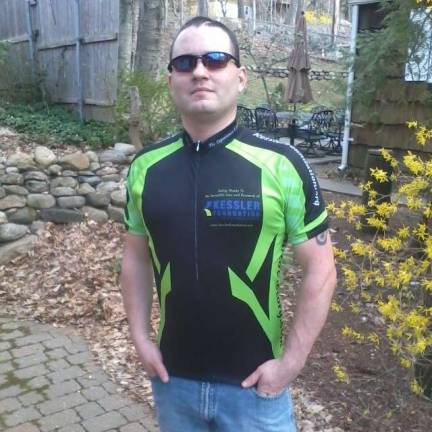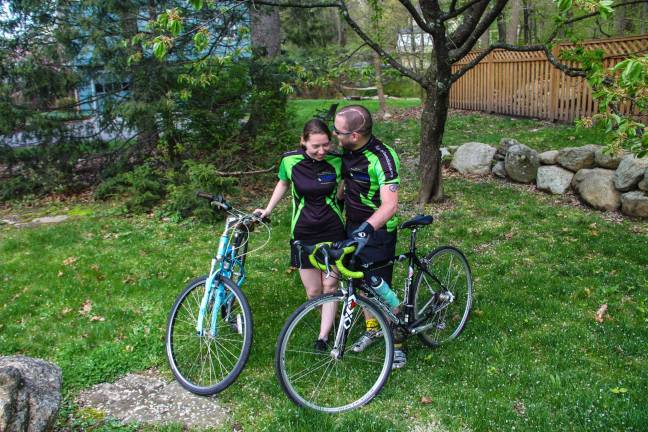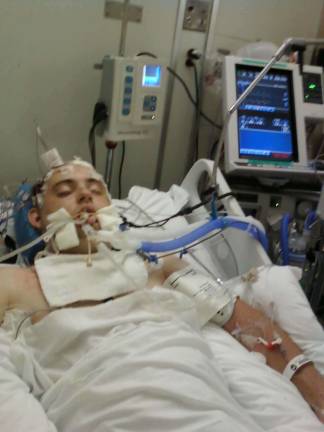Against all odds



BY GINNY PRIVITAR
RINGWOOD — On Aug. 11, 2010, Dan Mollino, a cable company employee, was on his first job of the day working 20 feet up a telephone pole to repair some overhead lines.
And then he fell.
Five and a half years later, Mollino, a member of the West Milford Elks, has made tremendous strides after this life-changing incident. His journey, both literally and figuratively, now is about using his experience to help others.
At the hospital, doctors had to remove a part of his skull to accommodate his swelling brain. He was put into a medically-induced coma. Hopes for his recovery were slight.
He was in the hospital for a month. Thanks to the care he received and the support of his family, Mollino pulled through. But he was a very different man.
After a month in the hospital, he was transferred to Kessler Rehabilitation Center in West Orange and was there for two more months. He credits the physicians and therapists there with helping him reclaim a functioning life. During those three months, his wife, Amber, a teacher, visited him every day. Outpatient therapy then continued for a year and a half, to rebuild his cognitive function.
“I had to learn to walk, talk and spell all over again, and I still have trouble with the last one,” Mollino said. He has recovered many skills, but there have been lasting damages from the fall.
Mollino has had times of depression, but strives to overcome difficulties and move forward. “I did the sitting in a chair thing and realized I just can’t keep doing that,” he said. “You learn to live with most of them (the challenges) and the other ones, hope you’ll learn to get past them. Or they end.”
After his three-month trip, he arrived in San Francisco on June 29 and reunited with his wife, an elementary school teacher, who had been tracking his progress on a map with the children in her class. She also used it as a teaching tool. As he passed through each state, they would learn about it. His June 29 finish was also his eighth wedding anniversary and the couple celebrated with a vacation in Hawaii.
“We’ve been through a lot; it’s been a long journey…we were only married for three years when this happened and I feel that it’s only made us grow closer and stronger as a couple,” Amber Mollino said.
Mollino’s goals for the ride included serving as an inspiration to others. He wanted the ride to show “that even with the disability and lasting issues, you can still achieve great things.”
He has also become an advocate for TBI survivors. Because TBI injuries are not as easily recognized as, for example, crippling arthritis, it can be difficult for those with TBI to obtain the Social Security Disability Insurance that they have paid into during their working lives.
Mollino said he seeks “to influence and motivate a legislative change to the current legislative short-fall in SSDI and how it evaluates and treats brain injury in the qualification process."
Although he himself will not benefit from his efforts to change the way SSDI eligibility for TBI is evaluated and processed, Mollino hopes it will help others in the same situation. To that end, he has authored a draft legislative proposal to change the way SSDI evaluates TBI and speed up the process. He has come to know many TBI survivors and said he recently heard of a friend who has been waiting five years for a hearing, only to be recently denied.
Mollino has already had talks with his district representative, Congressman Scott Garrett and with U.S. Senator Cory Booker’s staff, and expects to have more meetings on March 16, Brain Injury Awareness Day, on Capitol Hill. He hopes to arrange a meeting with Kevin Brady, chairman of the House Ways and Means Committee. Mollino and other TBI survivors and supporters of change will be there, trying to make their case. Garrett pointed out that anything to do with Social Security is a hot issue, and that the changes Mollino seeks will not happen until the issue of Social Security’s solvency is addressed first.
Mollino hopes his plan may be attached to any solvency measure.
After all he has been through, no one will be surprised if he succeeds with this goal too.
Editor's note: Mollino documented most of his journey on his Facebook page at facebook.com/tbitovictory. More information is available at his websites, tbitovictory.com and tbirider.com.